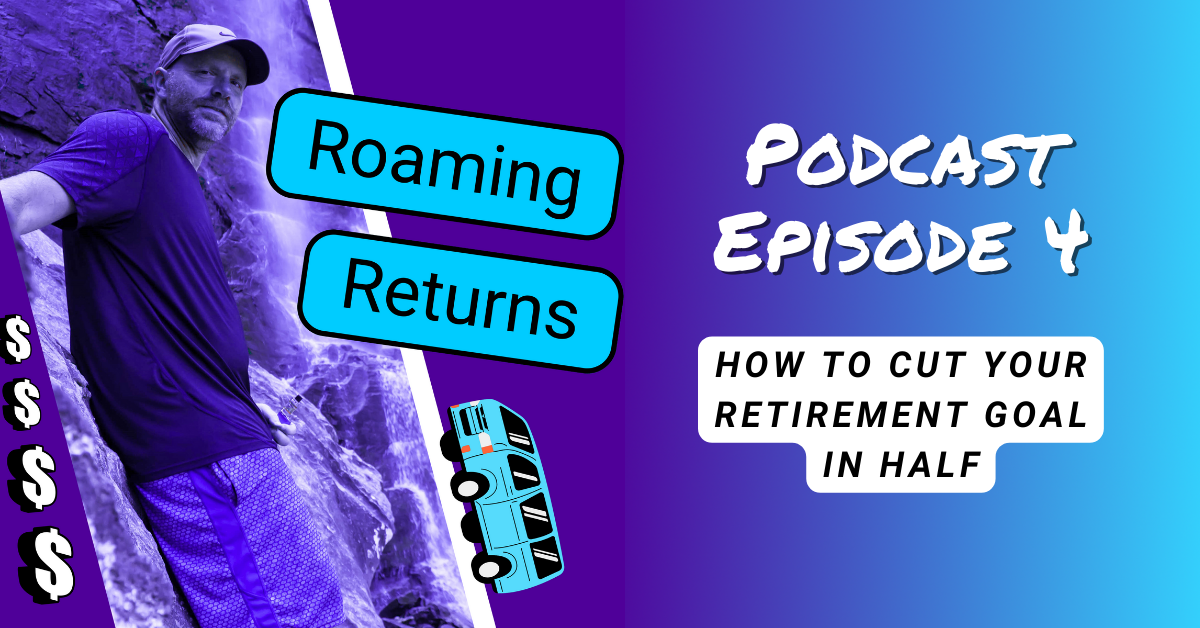This is the summary of Episode 4 of our Roaming Returns Podcast.
For a directory of podcast platforms you can listen on, click here. You can also listen on Facebook or YouTube.
**DISCLAIMER**
Ticker metrics change as markets and companies change, so always do your own research.
The content on this site is based on personal experience and is for educational purposes, not financial advice. See full disclaimer here.
This post contains affiliate links. If you buy anything using our links we make a small commission at no cost to you. Help support us by purchasing through our links if you’re interested in a product or service.
Podcast Summary
M
Please bear with us, this is still in progress.
Typically people come up with a lump sum target financial goal. It’s the same with most investing advisors to have that big number in mind. 1 Million is usually that target but sometimes its even higher if they scare you into accounting for inflation to maintain your cost of living.
the million gets you to
3 Things that can happen when you have a huge target goal you’re striving for
1 can feel defeating to strive for a big number
most people 1 m is unattainable especially when they’re later in life. and then take what currently making and the time left and divide that out. then they realize they can’t spend any extra money and it becomes unattainable and too much hardship to do over extended period of time.
depressed don’t start at all. what’s the point in starting if you can’t reach the number. and then numbs out by
hold onto hope without a plan and then hope to die before retirement needs kick in.
withholding and pain taking things out of your life hyjacks your willpower.
2 people accept that number and stick your nose to the grindstone
life passes you by, don’t really live. problem is what if you don’t make it that far? we hate the mentality of the defferred life plan until retirement. put off all the fun stuff until they;re old and might not be abl eto phsycaillly do that.
we want to help you create a better life sooner by building up Tim Ferriss deferred life.
working until retirement is such a narrative to accept the status quo. we’ve always believed that you should get to travel and phsyical adventures when you’re younger. (look into other cultures) take off in 20s instead of waiting until 65.
3 take on a lot of unnecessary risks to try to reach retirement goals sooner than later so you can live more quality years.
we fell into this category. ponzi schemes, lost tons of money in growth stocks, crypto, real estate, day trading, momentum trading, leverage trading, etc.
can do some of these things, but they didn’t fit the life we wanted and took us a while to figure that out. i tend to learn through experience. tim through trial and error.
if you get big setbacks you might fall back and end up in category 1. if something sounds too good to be true, it probably is. Found them through jim cocrum. got bad vibes from Amazon FBA selling. partnered with them. we got hung up because with all things considered this didn’t sound crazy.
after that loss it came out that i worked an entire year for free. although we can claim on tax losses.
desperation leads to poor decisions.
amazon FBA fell to the wayside for me because i don’t like consumerism and materialism. violated one of my core values of intentionalism.
this is why penny stocks and other investing publications are so spammy. they’re preying off your desperation and making money off you. trading is a zero sum gain game.
remember how i said the market always goes up. well penny stocks usually go down long run.
the key is to do your own research and for your own reasons that aren’t being made emotionally. this goes for our picks too. MPW if things we talk about aren’t for you, don’t get in. your criteria coudl be completely different from our or you’re ivesting style profile is more risk averse. or your timid and new. it’s okay to be more cautious when you’re first starting out.
How do they come up with those big target numbers?
why it is always 1 Million? tons of articles that pop up if you search. all use the same narrative and to do that you need to invest in blue chip overvalued growth stocks and work until 65. invest in small yielding investments while you work for 30+ years. PS mutual funds were made to screw you.
yieldstreet
media controls the narrative and never tells you how to actually get there. the reaosn the number is big you have to estimate your life span. people are living longer . articles show 65-80 as retirement years. dont take into consideration your personal housing situation or medical situation.
their strategy is flawed for numerous reasons. they don’t offer any alternate strategies which is why everyone thinks their way is the only way.
Guessing how long you’ll live is a flawed stratgy.
only god knows if youre goign to live 2 years or 20 years into retirement.
if you’re lucky and live to be in your 90s that 1M nest egg won’t go far enough using their investing/reitrement strategy.
if you leave your money invested banking on the 4% liquidation of asset rules conventional adn you are unlucky to have a bad market year early into retirement, it severely compromises your nest egg. (if you don’t move over to 100% bonds because they don’t pay enough to counter inflation).
rarely mention income investing or tax implications of their strategy. 70-75-80% of the income you had going into retirement.
What is the goal in retirement really?
It’s not the nest egg, its to use that nest egg to create a monthly income. And because of that you’re so protective of the value of your money so you’re more risk averse to where to keep it invested so it doesnt diminish.
But can’t you still make gains to keep it growing to support you through retirement?
so if the goal is to generate a monthly income, why not start with that right now as your focus? When you do that, you can at least slash that target number in half possibly more depending on how long your time horizon is.
Calculate what you need to retire right now
Instead of trying to figure out how long you’re going to live and adding things up over years all you need to do is this.
what are your monthly expenses right now.
monthly need x 1200/10. =
now this is how much you’d need to be able to invest right now and cover all your expenses if you invested into dividend paying assets that make 10% a year.
If you have at least 10 years to allow your money to compound, you can get started with a lot less. you double your money every 7-10 years when you allow tings to grow and compound.
And you get there even faster if the markets go down because you’re able to buy more shares and compound faster. see other podcast episode.
This is a significantly lower principle to reach than the crazy conventional way. And doesn’t that number make you excited and motivated to start saving for retirement?
When you’re able to cut your retirement timeframe from 40 years and a million dollars down to 10 years and 300,000. you’re able to find ways to make it happen versus finding reasons to never start.
and this right here is why we recommend having money in a non retirement account so that you don’t have to incur penalty if you plan to begin drawing your your dividends before age 59 1/2.
One of the easiest ways to find extra money to save is to stop unconsciously spending to drown out negative emotions. Consuption is a coping mechanism.
We don’t remember the things, we remember the experiences. like many of our trips we coverd in episode 1. So if you do more of those you’ll feel more fulfilled anyway and you can do a lot of these while saving money or consciously spending.
The other way they rationalize the continuous increase of that retirement number is by referring to inflation and future tax hikes.
Most dividends will increase with inflation, but the way to manually factor this in is to come up with a monthly number that allows you to reinvest between 10-20% of the monthly income back into investments. This is what we do anyway to save. It creates an automatic cushion and keeps your account compounding even while drawing on it.
You can also do something like we’re doing where we decided to take on odd jobs to supplement that income to allow our dividends to reinvest while the markets are taking a beating to compound our income faster. Go back and check out Episode 3 if this doesnt make sense to you.
We also plan to save up to not tap our dividends for the first year or two when we’re on the road by putting extra money into our emergency fund (Worthy).
We also have the option to travel creatively to reduce our expenses for a year or two when we hit the road to allow more compounding. This is short term enough to endure versus trying to withhold for 30 years.
Please Share Our Podcast With Others
We’re trying to grow so help us reach others who want to learn to invest with confidence. Spread the word and leave a review on whatever platform you use to listen to podcasts. This helps us rank in search.
We appreciate your support!



